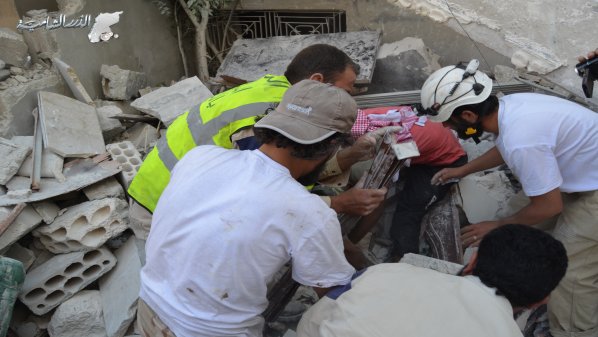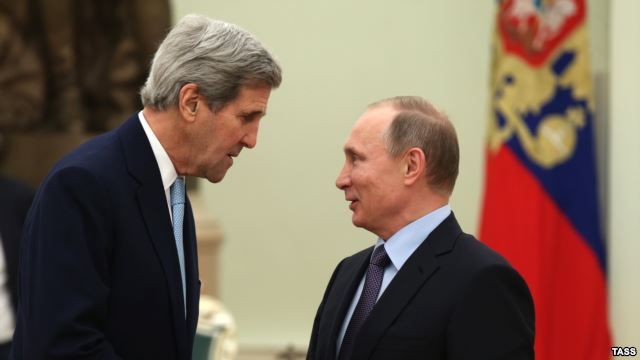PHOTO: US Secretary of State John Kerry with Russian President Vladimir Putin, December 2015
LATEST:
- Regime Forces Try to Advance Further Into Besieged Darayya
- Islamic State Claims Downing of Another Regime Warplane
- Islamic State Confirms Death of Leading Commander Omar al-Shishani
- LCC: 93 Killed on Wednesday Amid Regime “Ceasefire”
- Turkey: “Assad Must Go” Before “Normal Relations” with Syria
THURSDAY FEATURES
Syria Audio Analysis: Kerry’s Visit to Russia
Analysis: Kerry Sells Out to Russia Over Assad
Video: Assad to US TV — Russia’s “Crucial” Intervention Saved My Regime
US Secretary of State John Kerry visits Russia on Thursday, bringing President Obama’s proposal for deepened cooperation with Moscow inside Syria.
The proposal, adopted after a sharp debate within the Administration, sets out coordinated air attacks and extensive cooperation between US and Russian military and intelligence agencies. This will be overseen by a command-and-control headquarters with US and Russian military officers and intelligence operatives.
See Syria Analysis: Kerry Sells Out to Russia Over Assad
The “Joint Implementation Group” would be housed near Amman, Jordan, where there is already a US-led international Military Operations Center. Its mission will be to “enable expanded coordination between the United States and the Russian Federation beyond the established safety of flight procedures”.
The immediate objective of the plan is to work on operations against the Islamic State — the nominal, if not actual, focus of Russian aerial intervention since late September — and the jihadists of Jabhat al-Nusra.
At the same time, the proposal sets aside action to press the Assad regime for a political resolution of the 5 1/2-year conflict. An alternative initiative for targeted airstrikes on the Syrian military and support of some rebel factions was rejected by the White House.
Supporters of Obama’s proposal say the Russians will be asked to obtain a halt to regime bombing and to encourage President Assad to negotiate.
However, critics argue that Russia — despite nominally working for a now-dormant February 27 “cessation of hostilities” and the Geneva talks between January and April — has shown no willingness to limit the military operations or to press Assad into the lifting of sieges and release of political detainees, let alone acceptance of a transitional government.
Russia, which has carried out thousands of airstrikes on opposition areas since September, and the regime have stepped up air and grounds since mid-April.
Coordination and “Integrated Operations”
The US proposal sets out the initial sharing of intelligence through separate headquarters. Then, through the shared command-and-control center, “the participants should coordinate procedures to permit integrated operations” against the Islamic State and Jabhat al-Nusra. Those operations could include assistance of each other’s aerial forces.
In return, Russia would limit airstrikes to agreed targets and to ensure that the Assad regime will not bomb targets in “designated areas”.
However, Russia could still strike Jabhat al-Nusra unilaterally if it finds there is an “imminent threat” to its personnel, if Nusra advances beyond “designated areas”, or if Jabhat al-Nusra attacks pro-Assad forces from the “designated areas”.
No detail is given of the “designated areas”.
Regime Forces Try to Advance Further Into Besieged Darayya
Footage of the Syrian military trying to advance further into Darayya, the town southwest of Damascus that has been besieged since November 2012:
Armored vehicles, covered by intense shelling, are trying to enter neighborhoods.
The pro-Assad forces have tightened their grip on the town, taking plots of land in the southwest used to grow vegetables for the limited food supply. Earlier this week, they took eastern sections of Darayya, leading to rebel warnings that the town could fall soon.
Islamic State Claims Downing of Another Regime Warplane
The Islamic State is claiming the shootdown of another regime warplane.
ISIS claimed in a video on Thursday that it downed a MiG-23 jet fighter in Deir ez-Zor Province in eastern Syria, killing the pilot.
Warning — Graphic Images:
Syrian rebels have downed at least four warplanes in recent weeks. Last week the Islamic State said that it hit a Russian-piloted Mi-35 helicopter, the first Russian warplane shot down since Moscow’s intervention last September, and killed the two pilots.
Islamic State Confirms Death of Leading Commander Omar al-Shishani
The Islamic State has confirmed the death of a leading commander, Omar al-Shishani.
ISIS’s Amaq news agency said on Wednesday that Omar was killed in Shirqat in Iraq “as he participated in clashes to repel the campaign” against the Islamic State’s center of Mosul.
US officials said in March that Omar died from injuries several days after an American airstrike near al-Shaddadi in northeast Syria.
Omar was born Tarkhan Batirashvili in Georgia and served in the Georgian Army before being discharged and then serving time in prison. Soon after his release in early 2012, he went to Syria to fight, quickly becoming a commander of the faction Jaish al-Muhajireen wal Ansar.
Omar left the faction in late 2013 to join the Islamic State. Within months, he was named ISIS’s emir for northern Syria.
See Syria Analysis: The “True” Story of Insurgent Leader Abu Umar al-Shishani — & What It Means
LCC: 93 Killed on Wednesday Amid Regime “Ceasefire”
The Local Coordination Committees documented 93 deaths, including 16 children and 10 women, across Syria on Wednesday.
The killings came amid the Syrian military’s ongoing declaration of a “ceasefire”, first announced on July 6, as it continued airstrikes and ground operations.
Of Wednesday’s death, 27 were in Homs Province, most during pro-Assad airstrikes on Rastan. There were 26 in Aleppo Province amid airstrikes on Anadan and western Aleppo city, and 21 in Idlib Province as warplanes attacked Ariha.
Rescuers search among rubble in Ariha:

Turkey: “Assad Must Go” Before “Normal Relations” with Syria
A day after saying that Turkey needs to return to “normal relations” with Syria, Turkish Prime Minister Binali Yıldırım has added that President Assad must leave power.
Yıldırım told the BBC on Thursday:
It is for sure that something needs to change in Syria but above all Assad must go first.
Without Assad changing, nothing will change in Turkey. The main reason things have come to what it is because of Assad.
Yıldırım said on Wednesday, in an address to provincial leaders of the ruling Justice and Development Party (AKP), that he was “sure that we will return to normal relations with Syria as well [as other countries. We need that.”
Following Turkey’s move this month to restore relations with Russia, apologizing for the downing of a Russian warplane near the Turkish-Syrian border in November, the Prime Minister’s remarks were interpreted as a signal that Ankara would bow to Moscow’s support of Assad.
That interpretation was later denied by an AKP official.
Yıldırım tried to leave no doubt on Thursday, saying that a fight against the Islamic State — the nominal goal of Russia’s military intervention in Syria — did not entail acceptance of the Syrian President:
On the one hand, there is Assad, on the other, there is Daesh. If you ask me if we should choose between Assad or Daesh, we cannot choose either of them. They both need to go.

